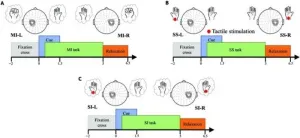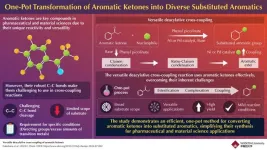(Press-News.org)
The field of precision medicine, especially in the context of cancer immunotherapy, has seen significant advancements in recent years. Precision medicine tailors treatment to the unique genetic and molecular profile of each patient, moving away from conventional one-size-fits-all approaches. This personalized strategy aims to minimize side effects and maximize therapeutic efficacy. A key component of this approach is the use of immune checkpoint inhibitors (ICIs), monoclonal antibodies that target immunosuppressive molecules such as PD-1, PD-L1, and CTLA-4. These ICIs have demonstrated considerable success in treating various types of cancer by enhancing the body's immune response against tumor cells.
Precision Medicine
Adoptive cell transfer therapy represents a significant breakthrough in precision medicine, particularly through the use of tumor-infiltrating lymphocytes (TILs), chimeric antigen receptor (CAR) T cells, and T cells engineered with T cell receptor (TCR) fragments. CAR T cell therapy, which has received FDA approval for several hematological malignancies, exemplifies the success of this approach. However, challenges such as high costs, toxicity, and difficulty targeting solid tumors persist. TCR-engineered T cells offer an alternative by targeting a broader range of antigens, though they carry risks such as fatal cardiotoxicity in some cases.
Natural killer (NK) cell therapy is emerging as a promising alternative, providing several advantages over CAR T cell therapies, including multiple mechanisms of action and reduced alloreactivity. CAR NK cells can potentially be used as an "off-the-shelf" product, bypassing the need for personalized treatments. However, issues such as low efficiency in CAR transduction and limited cell expansion remain obstacles.
A notable recent development in precision medicine is the identification and isolation of antitumor T cells from the blood of patients with metastatic solid cancers. This innovation allows for the development of personalized cancer immunotherapies without invasive surgery.
Therapeutic Vaccines
Therapeutic vaccines have traditionally been seen as preventive measures, but recent advances are positioning them as treatments for existing diseases, including cancer. Unlike conventional vaccines that target common pathogens, therapeutic vaccines are designed to elicit an immune response against specific cancer antigens. The focus has shifted towards personalized vaccines tailored to individual patients' tumor profiles.
Several therapeutic cancer vaccines have been approved by the FDA, including Sipuleucel-T for metastatic prostate cancer and T-VEC for advanced melanoma. The development of these vaccines involves identifying specific tumor antigens and using various platforms, such as viral vectors and oncolytic viruses, to deliver these antigens to the immune system. The landscape of cancer vaccines is evolving rapidly, with ongoing clinical trials exploring new vaccine formulations and combinations.
Recent clinical trials have highlighted the potential of personalized mRNA vaccines. For instance, a phase IIb clinical trial by Moderna demonstrated that a personalized mRNA vaccine combined with the checkpoint inhibitor pembrolizumab improved recurrence-free survival in high-risk melanoma patients. Another promising study from Memorial Sloan Kettering Cancer Center involved an mRNA vaccine targeting tumor neo-antigens, showing positive results in patients with pancreatic ductal adenocarcinoma.
Future Directions
The future of cancer immunotherapy lies in the continued development of personalized treatments, including mRNA vaccines and other novel therapeutic approaches. Self-amplifying RNA (saRNA) and other innovative platforms are being explored to enhance the immune response and overcome the challenges posed by the tumor microenvironment. The integration of these new technologies with existing immunotherapies promises to expand the arsenal of available treatments, offering new hope for patients with difficult-to-treat cancers.
Conclusions
In conclusion, the field of cancer immunotherapy is rapidly advancing, driven by innovations in precision medicine and therapeutic vaccines. The shift towards personalized treatments, leveraging the body's immune system to target cancer cells, represents a significant paradigm shift in oncology. As research continues to uncover new mechanisms and develop novel therapies, the future looks promising for more effective and targeted cancer treatments.
Full text
https://www.xiahepublishing.com/2835-3315/CSP-2024-00009
The study was recently published in the Cancer Screening and Prevention.
Cancer Screening and Prevention (CSP) publishes high-quality research and review articles related to cancer screening and prevention. It aims to provide a platform for studies that develop innovative and creative strategies and precise models for screening, early detection, and prevention of various cancers. Studies on the integration of precision cancer prevention multiomics where cancer screening, early detection and prevention regimens can precisely reflect the risk of cancer from dissected genomic and environmental parameters are particularly welcome.
Follow us on X: @xiahepublishing
Follow us on LinkedIn: Xia & He Publishing Inc.
END
In a groundbreaking study recently published, researchers from Zhejiang University have unveiled significant findings that could enhance brain-computer interface (BCI) technologies, marking a crucial step towards more intuitive neuroprosthetic control and advanced rehabilitation therapies. The study, titled "Neural Correlates of Motor/Tactile Imagery and Tactile Sensation in a BCI paradigm: A High-Density EEG Source Imaging Study," employed high-density electroencephalogram (EEG) recordings to delve into the neural dynamics of motor and ...
MIAMI (August 20, 2024) – Inhaler misuse leading to inadequate medication delivery impacts a person’s ability to manage symptoms of chronic obstructive pulmonary disease (COPD), and additional education about proper inhaler use is needed to improve health outcomes, according to two new articles. The articles are published in the July 2024 issue of Chronic Obstructive Pulmonary Diseases: Journal of the COPD Foundation, a peer-reviewed, open-access journal.
COPD comprises several conditions, including chronic bronchitis and emphysema, and can be caused by irritants like smoke or pollution and genetics. The disease affects more than 30 ...
During a pandemic, attention is usually focused on the immediate challenges, such as managing the disease, ensuring safety and coping with disruptions in daily routines. Adversity, while difficult, can sometimes lead to positive effects.
For older adults living in retirement communities, there has been limited research on how the COVID-19 pandemic and its regulatory measures affected them. Additionally, there is scant research on any potential positive effects for this population.
Now, a new study of 98 older adults (median age 86 years) living in a continuing care retirement community in South Florida during COVID-19 reveals ...
UTSA will partner with Texas A&M University to co-lead SECURE Southwest, one of five new regional centers being launched to strengthen U.S. research security.
Under a five-year, $67 million award from the National Science Foundation (NSF), the Safeguarding the Entire Community of the U.S. Research Ecosystem (SECURE) Center aims to strengthen intellectual property and research security by educating members of the research community about security issues and engaging them in a process of collaborative problem-solving.
The ...
A widely used security protocol that dates back to the days of dial-up Internet has vulnerabilities that could expose large numbers of networked devices to an attack and allow an attacker to gain control of traffic on an organization's network.
A research team led by University of California San Diego computer scientists investigated the Remote Authentication Dial-In User Service (RADIUS) protocol and found a vulnerability they call Blast-RADIUS that has been present for decades. RADIUS, designed in 1991, allows networked devices such as routers, switches or mobile roaming gear to use a remote server to validate login or other credentials.
This is a common set-up in enterprise and ...
A study of children’s conversations with their caretakers sheds light on the timeline of the emergence of moral foundation words in the first six years of life in English-speaking children. Moral Foundations theory posits that morality is largely intuitive and underlaid by modular foundations. The original set of five foundations proposed by researchers includes Care/Harm, Fairness/Cheating, Authority/Subversion, Loyalty/Betrayal, and Purity/Degradation. Aida Ramezani and colleagues systematically ...
Political animus between Republicans and Democrats in the United States is alarmingly high, raising fears of undemocratic or even violent actions. An often-touted intervention to prevent political polarization is to identify and correct misperceptions about people’s partisan opponents. Sean Westwood and colleagues sought to empirically test the effectiveness of this strategy. The authors surveyed 9,810 American partisans online from fall 2022 to fall 2023, finding that their opinions of whether ...
A newly discovered code within DNA – coined “spatial grammar” – holds a key to understanding how gene activity is encoded in the human genome.
This breakthrough finding, identified by researchers at Washington State University and the University of California, San Diego and published in Nature, revealed a long-postulated hidden spatial grammar embedded in DNA. The research could reshape scientists’ understanding of gene regulation and how genetic variations may influence gene expression in development or disease.
Transcription factors, the proteins that control which genes in one’s genome are turned on or off, ...
An ongoing survey captures how the Russian invasion of Ukraine affected attitudes in European countries not directly involved in the conflict. Margaryta Klymak and Tim Vlandas examine how the Russian invasion of Ukraine affected economic and political attitudes in eight European countries. The authors took advantage of the timing of the European Social Survey (ESS), which happened to be administered both just before and just after the Russian invasion of Ukraine in February 2022 in eight countries: Switzerland, Greece, Italy, Montenegro, Macedonia, Netherlands, Norway, and Portugal. Overall, the invasion increased support ...
Aromatic ketones have long been valuable intermediates in chemical synthesis, particularly in cross-coupling reactions where different chemical entities are combined to form new compounds. For instance, a process called deacylative cross-coupling removes the acyl group from the aromatic ketone, allowing it to bond with other chemicals and produce a wide variety of useful compounds. These reactions are crucial for producing a wide array of aromatic compounds used in various industries like agrochemicals.
However, the utility of aromatic ketones has been limited due to the difficulty in breaking their strong carbon-carbon bonds. These robust bonds are challenging to cleave, ...




